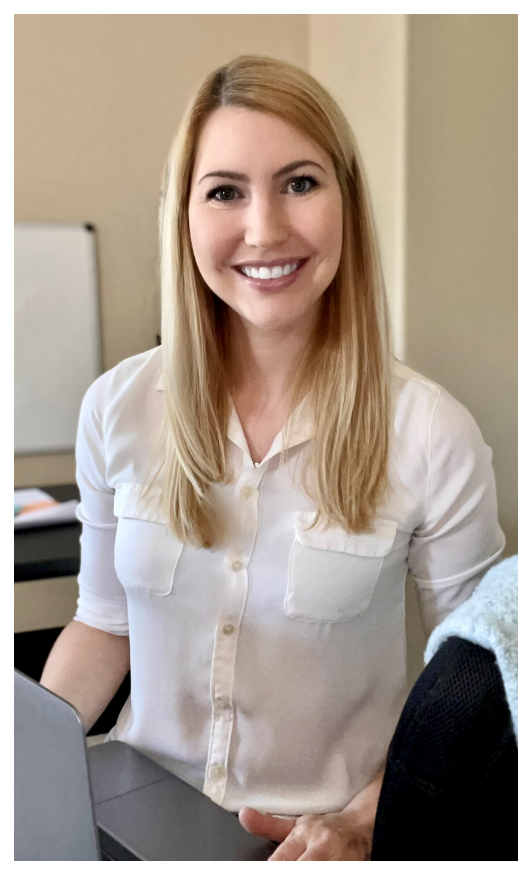
HI THERE, I'M
Dr. Katie Fracalanza
I'm a licensed clinical psychologist working at Stanford University as a Clinical Associate Professor. I also lead a private clinic called the California Psychology Center, where I train like-minded providers.
In my roles, I help people learn to work with stress and accept themselves. To stop people-pleasing and start listening to what they really want. For most of us, being kind to ourselves in the face of stress is a challenging, lifelong process.
Over the past decade as a clinical psychologist, I have been on a personal and professional journey to learn the most effective pathways to managing anxiety and becoming more self-compassionate. As a supervisor and consultant to other providers, I teach an approach of how to overcome anxiety from a place of self-love that I've developed from research, experience, and trial-and-error explorations.
My current goal is to make the insights that I've learned professionally and "the hard way" available to a broader range of people who may benefit. I'm developing classes on the core skills that have been life-changing for me, my patients, and my trainees over the years.

MY APPROACH
You don't need to try harder.
You just need the right tools.
-
Understanding Yourself
In my course, you'll learn where your people-pleasing ideas came from, and the main factors that make individuals vulnerable to people-pleasing. You'll explore the usefulness and limitations of people-pleasing in your current life situation.
-
True-Self Practice
My program provides step-by-step guidance that allows people to let go of people-pleasing systematically, without white-knuckling. You'll practice slowly being your true self and learn skills to tolerate the discomfort that comes up with this.
- Self-Kindness
Do you try to improve by criticizing yourself? Even though you might scare yourself into meeting your goals, the side effect of self-criticism is feeling anxious and exhausted. At the center of my approach is teaching you to make changes in your life from a place of understanding and supporting yourself.


Education & Training
I completed my postdoctoral fellowship at Stanford University’s School of Medicine, where I specialized in anxiety and mood disorders. I have extensive training in the following therapy modalities:
- Cognitive Behavioral Therapy
- Exposure and Response Prevention
- Acceptance and Commitment Therapy
- Mindfulness & Self-Compassion
I have been working in the field of mental health since 2008. My graduate school training includes a Master’s and Ph.D. in Clinical Psychology from Ryerson University in Toronto, Canada. The research I conducted throughout graduate school focused on better understanding factors that underpin anxiety and worry, such as perfectionism and intolerance of uncertainty, and how interventions for these experiences might be optimized. This work was recognized by the Canadian Psychological Association with a Certificate of Academic Excellence and was funded by awards from the Canadian Institutes of Health Research (CIHR).
Selected Publications
Laposa, J. M., & Fracalanza, K. (2019). Does intolerance of uncertainty mediate improvement in anger variables during group CBT for GAD? A preliminary investigation. Behavioural and Cognitive Psychotherapy, 1-9.
McCabe-Bennett, H., Fracalanza, K., & Antony, M. M. (2017). Treatment of generalized anxiety disorder. In D. David, S. Lynn, & G. Montgomery (Eds.), Evidence-based psychotherapy: The state of the science and practice. Hoboken, NJ: Wiley-Blackwell.
Gee, B. A., Fracalanza, K., & Antony, M. M. (2015). Behavior therapy. In R. Cautin & S. Lilienfeld (Eds.), Encyclopedia of clinical psychology. Wiley-Blackwell.
Woznica, A. L., Vickers, K., Koerner, N., Fracalanza, K. (2015). Reactivity to 35% carbon dioxide in bulimia nervosa and panic disorder. Psychiatry Research, 228, 571-575.
Fracalanza, K., Koerner, N., Antony, M. M. (2014). Testing a procedural variant of written imaginal exposure for generalized anxiety disorder. Journal of Anxiety Disorders, 28, 559-569.
Fracalanza, K., Koerner, N., Deschênes, S. S., Dugas, M. J. (2014). Intolerance of uncertainty mediates the relation between generalized anxiety disorder symptoms and anger. Cognitive Behaviour Therapy, 43, 122-132.
Koerner, N., & Fracalanza, K. (2012). The role of anxiety control strategies in imaginal exposure. In P. Neudeck & H. U. Wittchen (Eds.), Exposure Therapy: Rethinking the Model – Refining the Method. New York, NY: Springer Press.
Deschênes, S. S., Dugas, M. J., Fracalanza, K., Koerner, N. (2012). The role of anger in generalized anxiety disorder. Cognitive Behaviour Therapy, 41, 261-271.
Fracalanza, K., McCabe, R. E., Taylor, V. H., Antony, M. M. (2011). Bipolar disorder comorbidity in anxiety disorders: Relationship to demographic profile, symptom severity, and functional impairment. European Journal of Psychiatry, 25, 223-233.

